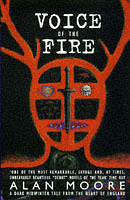Antony Johnston
Voice of the Fire is Alan Moore’s debut novel.
But Moore has been writing for as long as this reviewer can remember. Starting with the odd Future Shock and Time Twister for 2000AD, his radically original subject matter and unashamedly emotional style soon led to serial commissions, the most famous being the award-winning Ballad of Halo Jones. During this time Moore, like so many British creators, also began working for American comics where the wages, respect and contracts are more agreeable than here in the UK. He achieved cult fame with his reinvention of Swamp Thing, and his craft became ever more diverse and polished.
Voice of the Fire is Alan Moore’s debut novel.
In 1985, by now a writer for at least five years, Moore wrote Watchmen, a truly unique and original comic for its time. Unlike ‘proper’ comics which seek to continue their franchise for as long as economically possible, Watchmen was written as a limited, closed-arc story. It was written in twelve chapters, it was published in twelve chapters – and was so popular it became the first full comic story to be rebound in book form. Moore invented two things simultaneously, both by accident. “The 80s Comics Renaissance” and the “graphic novel”.
Nevertheless, Voice of the Fire is Alan Moore’s debut novel — and what a novel it is. Spanning five thousand years but never straying from within a ten-mile radius around Moore’s home of Northampton, this novel has the author’s hallmarks all over it. Ostensibly it is a tale of witchcraft and magic; from the first ‘Hob-Men,’ through Elizabethan court magicians, and finally ending with only myth, the oppressive twentieth century having imprisoned and buried humanity’s esoteric vision.
But there is far more to this book, hinted at during the retelling of Northampton legends and finally revealed in the last chapter, where Moore himself takes upon the role of narrator in a very real 1995 Northampton. Voice of the Fire is a tale of lost myths, of history’s subjective nature. As history must always be written by survivors, is any man’s history more ‘real’ than another’s? Who is to say?
Moore is also perturbed by humanity’s loss of vision, and implores us to dream again lest we be trapped forever in ever-decreasing circles of superficiality. From the closing chapters it is clear Moore believes we have lost our way somewhere along the line in the name of popular science. But Moore is not anti-scientific per se; as he shrewdly points out, even scientists of this century have not discounted the theories of subjective realities. It is humanity’s blind faith and newfound passivity which endangers us.
 |
 |
 |
 |
Moore questions what in our society has oppressed those visions and fancies we once had, where people centuries ago were pronounced dead by “Rising Lights,” “the Purples” or “Planet Shock,” and man built grand follies to match his grand dreams. In Moore’s own words:
“Everything grand we had, we tore it to bits. Our castles, our emporiums, our witches and our glorious poets. Smash it up, set fire to it and stick it in the fucking madhouse. Jesus Christ.”
For these, and others, are the tales Moore recounts; a beggar-woman turned nun who was flogged to death for receiving visions from Wotan. A mad poet who wrote beautiful verse and harmed none yet died in an asylum, sentenced there by his frustrated wife and son. Two Imp-summoning witches whose practices were at once both reviled and sought after by the same jealous, spiteful wives who eventually burned them. Moore does not profess to understand these self-destructive acts – can any of us? – but they are told with such emotion, and such naturalism, that one cannot help but feel sympathy for the narrators. Even the travelling salesman.
Does he succeed? In a word, yes. In the manner of his contemporary Neil Gaiman, Moore has the skill to convey his passion and allow the reader to at least glimpse through his eyes. Only the most jaded and cold-hearted among men could read his account of the dying Wise-Man, or the two witches, and not feel sympathy, even outrage. Like so many good writers, Moore is especially good at reminding us of what we already know, but forget too easily in the onward rush of survival; that we all love, we all feel pain, and we all must die.
Paradoxically, within this dark and melancholy book Moore inspires us to think again on the beauties of existence; of how precious is our time; and how, if we can just pause to remember the lessons we have learned and the bounties we possess, we may yet revive the eternal fires of history and learn from what they can tell us.
Voice of the Fire is a damn fine novel. For a debut.
